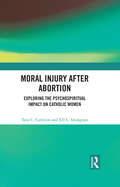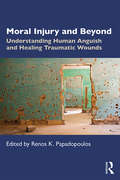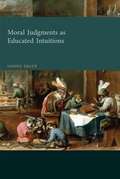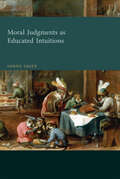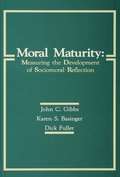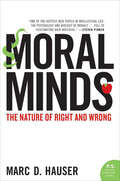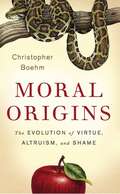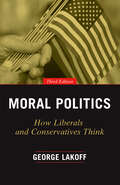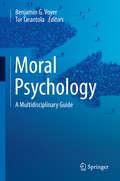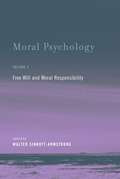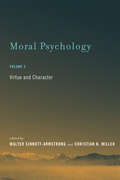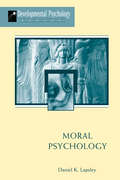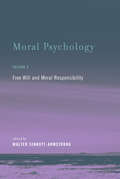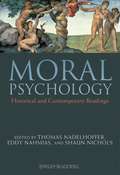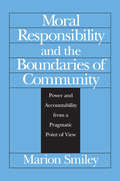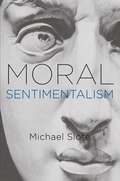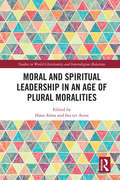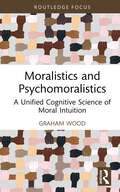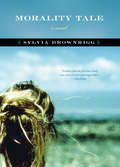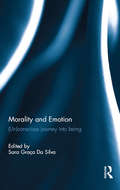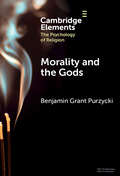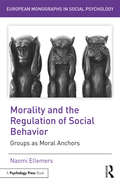- Table View
- List View
Moral Injury After Abortion: Exploring the Psychospiritual Impact on Catholic Women
by Tara C. Carleton Jill L. SnodgrassMoral Injury After Abortion delves deeply into the psychospiritual responses that some women experience when an abortive act conflicts with their moral beliefs and values. The book is grounded in a qualitative, phenomenological study that examined the lived experiences of thirty Christian women after abortion. The study participants’ voices are woven throughout the book in a way that offers the reader a narrative understanding of their experiences and a thick description of the psychospiritual impact of moral injury after abortion. The book provides mental health scholars and professionals with strategies for assessing for moral injury experiences among women post-abortion as well as a guide for addressing the spiritual and psychological impact of post-abortive moral injury.
Moral Injury and Beyond: Understanding Human Anguish and Healing Traumatic Wounds
by Renos K. PapadopoulosMoral Injury and Beyond: Understanding Human Anguish and Healing Traumatic Wounds uniquely brings together a prominent collection of international contributors from the fields of psychiatry, psychology, philosophy, theology, military chaplaincy and acute crisis care to address the phenomenon of moral injury. Introduced in the 1990s to refer to a type of psychological trauma, experienced especially by soldiers who felt that their actions transgressed the expected moral norms, this innovative volume provides a timely update that progresses and redefines the field of moral injury. The ten ground-breaking essays expand our understanding of moral injury beyond its original military context, arguing that it can fruitfully be applied to and address predicaments most persons face in their daily lives. Approaching moral injury from different perspectives, the contributors focus on the experiences of combat veterans and other survivors of violent forms of adversity. The chapters address thought-provoking questions and topics, such as how survivors can regain their hope and faith, and how they can, in time, explore ways that will lead them to grow through their suffering. Exploring moral injury with a particular emphasis on spirituality, the early Church Fathers form the framework within which several chapters examine moral injury, articulating a new perspective on this important subject. The insights advanced are not limited to theoretical innovations but also include practical methods of dealing with the effects of moral injury. This pioneering collection will be essential resource for mental health practitioners and trainees working with people suffering from severe trauma. Due to its interdisciplinary nature, it will be useful not only to those academics and professionals engaged with moral injury but will be a source of inspiration for any perceptive student of the complexities and dilemmas of modern life, especially as it interfaces with issues of mental health and spirituality. It will also be invaluable to academics and students of Jungian psychology, theology, philosophy and history interested in war, migration and the impact of extreme forms of adversity.
Moral Jeopardy: Risks of Accepting Money from the Alcohol, Tobacco and Gambling Industries (International Research Monographs in the Addictions)
by Peter J. AdamsTobacco, alcohol and gambling corporations have been highly effective in stalling, diverting and blocking public health measures. This book provides an original and engaging exposé of the ethical issues faced by people and organizations when they accept industry money in ways that facilitate corporate influence with the public and with policy makers. It starts with a detailed examination of the risks of accepting such profits and what might be done to reduce them, then moves on to introduce the concept of a continuum of 'moral jeopardy' which shifts the emphasis from accept/not accept binaries to a focus on the extent to which people are willing to accept funding. This shift encourages people to think and speak more about the risks and to develop clearer positions for themselves. The content will be helpful to those working in government agencies, addiction services, community organizations or anyone interested in reducing the harms of addictive consumption. Confronts ethical issues associated with conflicts of interest that influence many in governments, communities and universities. Develops a framework for action and intervention aimed at reducing moral jeopardy. Draws on psychology, philosophy, public health, social theory and addiction studies.
Moral Judgments as Educated Intuitions
by Hanno SauerRationalists about the psychology of moral judgment argue that moral cognition has a rational foundation. Recent challenges to this account, based on findings in the empirical psychology of moral judgment, contend that moral thinking has no rational basis. In this book, Hanno Sauer argues that moral reasoning does play a role in moral judgment -- but not, as is commonly supposed, because conscious reasoning produces moral judgments directly. Moral reasoning figures in the acquisition, formation, maintenance, and reflective correction of moral intuitions. Sauer proposes that when we make moral judgments we draw on a stable repertoire of intuitions about what is morally acceptable, which we have acquired over the course of our moral education -- episodes of rational reflection that have established patterns for automatic judgment foundation. Moral judgments are educated and rationally amenable moral intuitions. Sauer engages extensively with the empirical evidence on the psychology of moral judgment and argues that it can be shown empirically that reasoning plays a crucial role in moral judgment. He offers detailed counterarguments to the anti-rationalist challenge (the claim that reason and reasoning play no significant part in morality and moral judgment) and the emotionist challenge (the argument for the emotional basis of moral judgment). Finally, he uses Joshua Greene's Dual Process model of moral cognition to test the empirical viability and normative persuasiveness of his account of educated intuitions. Sauer shows that moral judgments can be automatic, emotional, intuitive, and rational at the same time.
Moral Judgments as Educated Intuitions
by Hanno SauerAn argument that moral reasoning plays a crucial role in moral judgment through episodes of rational reflection that have established patterns for automatic judgment foundation. Rationalists about the psychology of moral judgment argue that moral cognition has a rational foundation. Recent challenges to this account, based on findings in the empirical psychology of moral judgment, contend that moral thinking has no rational basis. In this book, Hanno Sauer argues that moral reasoning does play a role in moral judgment—but not, as is commonly supposed, because conscious reasoning produces moral judgments directly. Moral reasoning figures in the acquisition, formation, maintenance, and reflective correction of moral intuitions. Sauer proposes that when we make moral judgments we draw on a stable repertoire of intuitions about what is morally acceptable, which we have acquired over the course of our moral education—episodes of rational reflection that have established patterns for automatic judgment foundation. Moral judgments are educated and rationally amenable moral intuitions. Sauer engages extensively with the empirical evidence on the psychology of moral judgment and argues that it can be shown empirically that reasoning plays a crucial role in moral judgment. He offers detailed counterarguments to the anti-rationalist challenge (the claim that reason and reasoning play no significant part in morality and moral judgment) and the emotionist challenge (the argument for the emotional basis of moral judgment). Finally, he uses Joshua Greene's Dual Process model of moral cognition to test the empirical viability and normative persuasiveness of his account of educated intuitions. Sauer shows that moral judgments can be automatic, emotional, intuitive, and rational at the same time.
Moral Luck
by Bernard WilliamsMoral Luck centres on questions of moral philosophy and the theory of rational action. That whole area has of course been strikingly reinvigorated over the last decade, and philosophers have both broadened and deepened their concerns in a way that now makes much earlier moral and political philosophy look sterile and trivial.
Moral Maturity: Measuring the Development of Sociomoral Reflection
by John C. Gibbs Karen S. Basinger Dick Fuller Richard L. FullerThe traditional production measure of moral judgment has been the Moral Judgment Interview (MJI), which uses hypothetical moral dilemmas to elicit moral judgment. However, the MJI dilemmas have been criticized as artificial and may not be entirely appropriate for children, certain cultures, and practical moral situations. This unique volume utilizes and evaluates a new production measure of moral judgment, the Sociomoral Reflection Measure -- Short Form (SRM-SF), which substitutes brief stimulus materials and evaluative questions for the moral dilemma technique. The authors report that the SRM-SF exhibits an impressive degree of reliability and validity and is quicker to administer and score than other available measures. To illustrate these findings, this book offers the resources needed for the assessment of the Kohlbergian stage of moral judgment using the SRM-SF. These resources include: an up-to-date review of research and theory, a group-administrable questionnaire, an efficient scoring manual, and self-training exercises in assessment. Psychometrically sound and practical, the SRM-SF has the potential to become the leading moral judgment measure of the 90s.
Moral Minds: The Nature of Right and Wrong
by Marc D. HauserA Harvard scientist illuminates the biological basis for human morality in this groundbreaking book.With the diversity of moral attitudes found across cultures around the globe, it is easy to assume that moral perspectives are socially developed—a matter of nurture rather than nature. But in Moral Minds, Marc Hauser presents compelling evidence to the contrary, and offers a revolutionary new theory: that humans have evolved a universal moral instinct.Hauser argues that certain biologically innate moral principles propel us toward judgments of right and wrong independent of gender, education, and religion. Combining his cutting-edge research with the latest findings in cognitive psychology, linguistics, neuroscience, evolutionary biology, economics, and anthropology, Hauser explores the startling implications of his provocative theory vis-à-vis contemporary bioethics, religion, the law, and our everyday lives.
Moral Origins: The Evolution of Virtue, Altruism, and Shame
by Christopher BoehmBoehm (anthropology and biological science, U. of Southern California) explores different facets of moral behavior and human sociobiology to present an evolutionary account of altruism, shame, and virtue. Specific issues include how natural selection bears on generosity in both kin and extra-kin contexts, how we learn to police deviant behaviors in ourselves and others, the evolutionary success of egalitarian communities, social selection as "purposeful" natural selection, egotism, and reciprocity. A final chapter speculates on humanity and its future viability after several centuries that show a marked decline in sociality. Boehm writes for an intelligent lay audience rather than for specialists. Annotation ©2012 Book News, Inc. , Portland, OR (booknews. com)
Moral Politics: How Liberals and Conservatives Think, Third Edition
by George LakoffWhen Moral Politics was first published two decades ago, it redefined how Americans think and talk about politics through the lens of cognitive political psychology. Today, George Lakoff's classic text has become all the more relevant, as liberals and conservatives have come to hold even more vigorously opposed views of the world, with the underlying assumptions of their respective worldviews at the level of basic morality. Even more so than when Lakoff wrote, liberals and conservatives simply have very different, deeply held beliefs about what is right and wrong. Lakoff reveals radically different but remarkably consistent conceptions of morality on both the left and right. Moral worldviews, like most deep ways of understanding the world, are unconscious--part of our "hard-wired" brain circuitry. When confronted with facts that don't fit our moral worldview, our brains work automatically and unconsciously to ignore or reject these facts, and it takes extraordinary openness and awareness of this phenomenon to pay critical attention to the vast number of facts we are presented with each day. For this new edition, Lakoff has added a new preface and afterword, extending his observations to major ideological conflicts since the book's original publication, from the Affordable Care Act to the wars in Iraq and Afghanistan, the recent financial crisis, and the effects of global warming. One might have hoped such massive changes would bring people together, but the reverse has actually happened; the divide between liberals and conservatives has become stronger and more virulent. To have any hope of bringing mutual respect to the current social and political divide, we need to clearly understand the problem and make it part of our contemporary public discourse. Moral Politics offers a much-needed wake-up call to both the left and the right.
Moral Psychology
by Benjamin G. Voyer Tor TarantolaThis fascinating and timely volume explores current thinking on vital topics in moral psychology, spanning the diverse disciplines that contribute to the field. Academics from cognitive science, evolutionary biology, anthropology, philosophy, and political science address ongoing and emerging questions aimed at understanding the thought processes and behaviors that underlie our moral codes--and our transgressions. Cross-cutting themes speak to individual, interpersonal, and collective morality in such areas as the development of ethical behavior, responses to violations of rules, moral judgments in the larger discourse, and universal versus specific norms. This wide-angle perspective also highlights the implications of moral psychology research for policy and justice, with cogent viewpoints from: #65533; Philosophy: empiricism and normative questions, moral relativism. #65533; Evolutionary biology: theories of how altruism and moral behavior evolved. #65533; Anthropology: common moral values seen in ethnographies from different countries. #65533; Cognitive and neural sciences: computational models of moral systems and decision-making. #65533; Political science: politics, governance, and moral values in the public sphere. #65533; Advice on moral psychology research--and thoughts about its future--from prominent scholars. With the goal of providing a truly multidisciplinary forum for moral psychology, this volume is sure to spark conversations across disciplines and advance the field as a whole. Sampling the breadth and depth of an equally expansive and transformative field, Moral Psychology: A Multidisciplinary Guide will find an engaged audience among psychologists, philosophers, evolutionary biologists, anthropologists, political scientists, neuroscientists, lawyers, and policymakers, as well as a more general audience interested in better understanding the complexity of moral psychology research.
Moral Psychology
by Walter Sinnott-ArmstrongTraditional philosophers approached the issues of free will and moral responsibility through conceptual analysis that seldom incorporated findings from empirical science. In recent decades, however, striking developments in psychology and neuroscience have captured the attention of many moral philosophers. This volume of Moral Psychology offers essays, commentaries, and replies by leading philosophers and scientists who explain and use empirical findings from psychology and neuroscience to illuminate old and new problems regarding free will and moral responsibility. The contributors -- who include such prominent scholars as Patricia Churchland, Daniel Dennett, and Michael Gazzaniga -- consider issues raised by determinism, compatibilism, and libertarianism; epiphenomenalism, bypassing, and naturalism; naturalism; and rationality and situationism. These writings show that although science does not settle the issues of free will and moral responsibility, it has enlivened the field by asking novel, profound, and important questions.ContributorsRoy F. Baumeister, Tim Bayne, Gunnar Björnsson, C. Daryl Cameron, Hanah A. Chapman, William A. Cunningham, Patricia S. Churchland, Christopher G. Coutlee, Daniel C. Dennett, Ellen E. Furlong, Michael S. Gazzaniga, Patrick Haggard, Brian Hare, Lasana T. Harris, John-Dylan Haynes, Richard Holton, Scott A. Huettel, Robert Kane, Victoria K. Lee, Neil Levy, Alfred R. Mele, Christian Miller, Erman Misirlisoy, P. Read Montague, Thomas Nadelhoffer, Eddy Nahmias, William T. Newsome, B. Keith Payne, Derk Pereboom, Adina L. Roskies, Laurie R. Santos, Timothy Schroeder, Michael N. Shadlen, Walter Sinnott-Armstrong, Chandra Sripada, Christopher L. Suhler, Manuel Vargas, Gideon Yaffe
Moral Psychology, Volume 5: Virtue and Character (Bradford Bks.)
by Walter Sinnott-Armstrong Christian MillerGroundbreaking essays and commentaries on the ways that recent findings in psychology and neuroscience illuminate virtue and character and related issues in philosophy.Philosophers have discussed virtue and character since Socrates, but many traditional views have been challenged by recent findings in psychology and neuroscience. This fifth volume of Moral Psychology grows out of this new wave of interdisciplinary work on virtue, vice, and character. It offers essays, commentaries, and replies by leading philosophers and scientists who explain and use empirical findings from psychology and neuroscience to illuminate virtue and character and related issues in moral philosophy. The contributors discuss such topics as eliminativist and situationist challenges to character; investigate the conceptual and empirical foundations of self-control, honesty, humility, and compassion; and consider whether the virtues contribute to well-being.ContributorsKarl Aquino, Jason Baehr, C. Daniel Batson, Lorraine L. Besser, C. Daryl Cameron, Tanya L. Chartrand, M. J. Crockett, Bella DePaulo, Korrina A. Duffy, William Fleeson, Andrea L. Glenn, Charles Goodman, Geoffrey P. Goodwin, George Graham, June Gruber, Thomas Hurka, Eranda Jayawickreme, Andreas Kappes, Kristján Kristjánsson, Daniel Lapsley, Neil Levy, E.J. Masicampo, Joshua May, Christian B. Miller, M. A. Montgomery, Thomas Nadelhoffer, Eddy Nahmias, Hanna Pickard, Katie Rapier, Raul Saucedo, Shannon W. Schrader, Walter Sinnott-Armstrong, Nancy E. Snow, Gopal Sreenivasan, Chandra Sripada, June P. Tangney, Valerie Tiberius, Simine Vazire, Jennifer Cole Wright
Moral Psychology: Explorations In Moral Psychology (Developmental Psychology Series)
by Daniel K Lapsley<p>Moral functioning is a defining feature of human personhood and human social life. Moral Psychology provides an integrative and evaluative overview of the theoretical and empirical traditions that have attempted to make sense of moral cognition, prosocial behavior, and the development of virtuous character. <p>This is the first book to integrate a comprehensive review of the psychological literatures with allied traditions in ethics. Moral rationality and decisionmaking; the development of the sense of fairness and justice, and of prosocial dispositions; as well as the notion of moral self and moral identity and their relation to issues of character and virtue are fully discussed in the rich contexts provided by psychological and philosophical paradigms. Lapsley emphasizes parenting and educational strategies for influencing moral behavior, reasoning, and character development, and charts a line of research for the “post-Kohlbergian era” in moral psychology. <p>This book will be an invaluable text for advanced courses in moral psychology, as taught in departments of psychology, education, and philosophy. It will also prove to be a standard reference work for researchers and ethicists alike.</p>
Moral Psychology: Free Will and Moral Responsibility (Bradford Books #Vol. 4)
by Walter Sinnott-ArmstrongLeading philosophers, psychologists, and neuroscientists address issues of moral responsibility and free will, drawing on new findings from empirical science. Traditional philosophers approached the issues of free will and moral responsibility through conceptual analysis that seldom incorporated findings from empirical science. In recent decades, however, striking developments in psychology and neuroscience have captured the attention of many moral philosophers. This volume of Moral Psychology offers essays, commentaries, and replies by leading philosophers and scientists who explain and use empirical findings from psychology and neuroscience to illuminate old and new problems regarding free will and moral responsibility. The contributors—who include such prominent scholars as Patricia Churchland, Daniel Dennett, and Michael Gazzaniga—consider issues raised by determinism, compatibilism, and libertarianism; epiphenomenalism, bypassing, and naturalism; naturalism; and rationality and situationism. These writings show that although science does not settle the issues of free will and moral responsibility, it has enlivened the field by asking novel, profound, and important questions. Contributors Roy F. Baumeister, Tim Bayne, Gunnar Björnsson, C. Daryl Cameron, Hanah A. Chapman, William A. Cunningham, Patricia S. Churchland, Christopher G. Coutlee, Daniel C. Dennett, Ellen E. Furlong, Michael S. Gazzaniga, Patrick Haggard, Brian Hare, Lasana T. Harris, John-Dylan Haynes, Richard Holton, Scott A. Huettel, Robert Kane, Victoria K. Lee, Neil Levy, Alfred R. Mele, Christian Miller, Erman Misirlisoy, P. Read Montague, Thomas Nadelhoffer, Eddy Nahmias, William T. Newsome, B. Keith Payne, Derk Pereboom, Adina L. Roskies, Laurie R. Santos, Timothy Schroeder, Michael N. Shadlen, Walter Sinnott-Armstrong, Chandra Sripada, Christopher L. Suhler, Manuel Vargas, Gideon Yaffe
Moral Psychology: Historical and Contemporary Readings
by Shaun Nichols Eddy Nahmias Thomas NadelhofferMoral Psychology: Historical and Contemporary Readings is the first book to bring together the most significant contemporary and historical works on the topic from both philosophy and psychology. Provides a comprehensive introduction to moral psychology, which is the study of psychological mechanisms and processes underlying ethics and morality. Unique in bringing together contemporary texts by philosophers, psychologists and other cognitive scientists with foundational works from both philosophy and psychology. Approaches moral psychology from an empirically informed perspective. Explores a wide range of topics from passion and altruism to virtue and responsibility. Editorial introductions to each section explain the background of and connections between the selections.
Moral Responsibility and the Boundaries of Community: Power and Accountability from a Pragmatic Point of View
by Marion SmileyThe question of responsibility plays a critical role not only in our attempts to resolve social and political problems, but in our very conceptions of what those problems are. Who, for example, is to blame for apartheid in South Africa? Is the South African government responsible? What about multinational corporations that do business there? Will uncovering the "true facts of the matter" lead us to the right answer? In an argument both compelling and provocative, Marion Smiley demonstrates how attributions of blame--far from being based on an objective process of factual discovery--are instead judgments that we ourselves make on the basis of our own political and social points of view. She argues that our conception of responsibility is a singularly modern one that locates the source of blameworthiness in an individual's free will. After exploring the flaws inherent in this conception, she shows how our judgments of blame evolve out of our configuration of social roles, our conception of communal boundaries, and the distribution of power upon which both are based. The great strength of Smiley's study lies in the way in which it brings together both rigorous philosophical analysis and an appreciation of the dynamics of social and political practice. By developing a pragmatic conception of moral responsibility, this work illustrates both how moral philosophy can enhance our understanding of social and political practices and why reflection on these practices is necessary to the reconstruction of our moral concepts.
Moral Sentimentalism
by Michael SloteThere has recently been a good deal of interest in moral sentimentalism, but most of that interest has been exclusively either in metaethical questions about the meaning of moral terms or in normative issues about benevolence and/or caring and their place in morality. In Moral SentimentalismMichael Slote attempts to deal with both sorts of issues and to do so, primarily, in terms of the notion or phenomenon of empathy. Hume sought to do something like this over two centuries ago, though he didn't have the term "empathy" and used "sympathy" instead; and in effect Slote is seeking togive moral sentimentalism a "second wind" in and for contemporary circumstances. By relying systematically on empathy in its account of normative morality and in what it has to say about the meaning of moral vocabulary, Moral Sentimentalism offers a unified overall ethical picture that can then betested against ethical rationalism. Rationalism has recently dominated the scene in ethics, but by showing how sentimentalism can make coherent and intuitive sense of such preferred rationalist notions as autonomy, respect, and justice--and by showing how a sentimentalism based in empathy can dealwith ethically significant aspects of the moral life that rationalism tends to ignore or skimp on--Slote hopes a wider and more active debate between rationalism and sentimentalism can be set in motion. There are signs that sentimentalist modes of thought are gaining new footholds on the way ethicsis done, and this new book is very hopeful about these possibilities.
Moral and Intellectual Virtues in Practices: Through the Eyes of Scientists and Musicians
by Darcia Narvaez Mark Graves Timothy Reilly Keke Kaikhosroshvili Stefanie Israel de SouzaThis book provides an integrative interdisciplinary view of how intellectual and moral virtues are understood in two separate practices, science and music. The authors engage with philosophical and psychological accounts of virtue to understand scientists’ and musicians’ understandings of intellectual and moral virtues. They present empirical evidence substantiating the MacIntyrean claim that traditions and practices are central to understanding the virtues."
Moral and Spiritual Leadership in an Age of Plural Moralities (Studies in World Christianity and Interreligious Relations)
by Ina Ter Avest Hans AlmaIn crisis situations, such as terror attacks or societal tensions caused by migration, people tend to look for explicit moral and spiritual leadership and are often inclined to vote for so-called 'strong leaders'. Is there a way to resist the temptation of the simplistic solutions that these ‘strong leader’ offer, and instead encourage constructive engagement with the complex demands of our times? This volume utilises relational and dialogical perspectives to examine and address many of the issues surrounding the moral and spiritual guidance articulated in globalizing Western societies. The essays in this collection focus on the concept of plural moralities, understood as divergent visions on what is a 'good life', both in an ethical, aesthetical, existential, and spiritual sense. They explore the political-cultural context and consequences of plural moralities as well as discussing challenges, possibilities, risks, and dangers from the perspective of two promising relational theories: social constructionism and dialogical self theory. The overarching argument is that it is possible to constructively put in nuanced moral and spiritual guidance into complex, plural societies. By choosing a clear theoretical focus on relational approaches to societal challenges, this interdisciplinary book provides both a broad scope and a coherent argument. It will be of great interest to scholars of social and political psychology, leadership and organization, religious studies, and pedagogy.
Moralistics and Psychomoralistics: A Unified Cognitive Science of Moral Intuition (Routledge Focus on Philosophy)
by Graham WoodThis book brings together three distinct research programs in moral psychology – Moral Foundations Theory, Cognitive Adaptations for Social Exchange and the Linguistic Analogy in Moral Psychology – and shows that they can be combined to create a unified cognitive science of moral intuition. The book assumes evolution has furnished the human mind with two types of judgement: intuitive and deliberative. Focusing on moral intuitions (understood as moral judgments that were not arrived at via a process of conscious deliberation), the book explores the origins of these intuitions, examines how they are produced, and explains why the moral intuitions of different humans differ. Providing a unique synthesis of three separate established fields, this book presents a new research program that will further our understanding of the various different intuitive moral judgements at the heart of some of the moral tensions within human society.
Morality Tale: A Novel
by Sylvia BrownriggWhen this novel's unnamed narrator meets the elusive but exciting Richard (an envelope salesman with a nice layman's line in Zen philosophies), he offers her a friendly escape from her dreary domestic life. Burdened by her husband's ongoing negotiations with his angry ex–wife, the strains of looking after two stepchildren, and the lingering ghost of her own past betrayals, she finds that the life of a "second marryer" leaves much to be desired. As their friendship develops, so grows the shadow cast over her marriage, and when they make a late, illicit bay crossing on a ferryboat, the story gathers momentum under California's Mount Tamalpais. There, in the fabled Golden State, Sylvia Brownrigg shows how even a layman's Zen can lead to some important revelations about the need to look forward, not back. Bristling with honesty and wit, Morality Tale explores the triangular complications that can befall a modern marriage and the tragicomic forces that surround them.
Morality and Emotion
by Sara Graça Da SilvaDespite the many attempts to disentangle the relationship between morality and emotion, as is clear from the myriad of approaches that try to understand the nature and importance of their connection, the extent of this synergy remains rather controversial. The multidisciplinary framework of the present volume was specifically designed to challenge self-containing disciplinary views, encouraging a more integrative analysis that covers various methodological angles and theoretical perspectives. Contributions include discussions on the interrelation between moral philosophy, emotion and identity, namely the clash between grand ethical theories and the practicality of human life; philosophical considerations on akrasia or the so called weakness of will, and the factors behind it; anthropological reflections on empathy and prosocial behavior; accounts from artificial intelligence and evolutionary game theory; and literary and artistic dissections of emotional responses to the representational power of fiction and the image. The inclusion of chapters from varied scientific backgrounds substantially enriches this debate and shows that several core questions, such as the ones related to identity and to the way we perceive the other and ourselves, are transversal. It is therefore valuable and pressing to further explore these common threads, and to encourage disciplinary dialogues across both traditional and emerging fields to help shed new light on the puzzling and fascinating ways in which morality and emotion are mutually imbricated.
Morality and the Gods (Elements in the Psychology of Religion)
by Benjamin Grant PurzyckiThe relationship between religion and morality has been a steadfast topic of inquiry since the dawn of the social sciences. This Element probes how the social sciences have addressed this relationship by detailing how theory and method have evolved over the past few generations. Sections 1 and 2 examine the historical roots of cross-cultural inquiry and Section 3 addresses the empirical tools developed to address cross-cultural patterns statistically. Sections 4-6 address how the contemporary evolutionary social sciences have been addressing the role religious cognition, behaviour, and beliefs play on moral conduct. By critically examining the tools and theories specifically developed to answer questions about the evolution of morality, society, and the gods, this Element shows that much of our current knowledge about this relationship has been significantly shaped by our cultural history as a field. It argues that the relationship between religion and morality is, despite considerable diversity in form, quite common around the world.
Morality and the Regulation of Social Behavior: Groups as Moral Anchors (European Monographs in Social Psychology)
by Naomi EllemersMorality indicates what is the ‘right’ and what is the ‘wrong’ way to behave. It is one of the most popular areas of research in contemporary social psychology, driven in part by recent political-economic crises and the behavioral patterns they exposed. In the past, work on morality tended to highlight individual concerns and moral principles, but more recently researchers have started to address the group context of moral behavior. In Morality and the Regulation of Social Behavior: Groups as Moral Anchors, Naomi Ellemers builds on her extensive research experience to draw together a wide range of insights and findings on morality. She offers an essential integrative summary of the social functions of moral phenomena, examines how social groups contribute to moral values, and explains how groups act as ‘moral anchors’. Her analysis suggests that intragroup dynamics and the desire to establish a distinct group identity are highly relevant to understanding the implications of morality for the regulation of individual behavior. Yet, this group-level context has not been systematically taken into account in research on morality, nor is it used as a matter of course to inform attempts to influence moral behavior. Building on social identity and self-categorization principles, this unique book explicitly considers social groups as an important source of moral values, and examines how this impacts on individual decision making as well as collective behaviors and relations between groups in society. Throughout the book, Ellemers presents results from her own research to elucidate how social behavior is affected by moral concerns. In doing this, she highlights how such insights advance our understanding of moral behavior and moral judgments for of people who live together in communities and work together in organizations. Morality and the Regulation of Social Behavior is essential reading for academics and students in social psychology and related disciplines, and is an invaluable resource for practitioners interested in understanding moral behavior.
